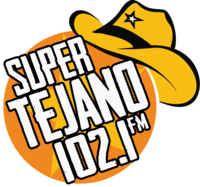KBUC
KBUC (branded as Super Tejano 102.1 & 95.3 FM) is a radio station broadcasting a tejano music format simulcasted on sister station, 95.3 FM KZSP.[1] Licensed to Raymondville, Texas, United States, the station serves the McAllen-Brownsville-Harlingen area. The station is owned by R Communications Group] LLC through its licensee MBM Texas Valley, LLC.[2] The station has obtained a construction permit from the FCC for a power increase to 37,000 watts.[3] KBUC also served as the flagship station for the Rio Grande Valley Killer Bees. KBUC formerly broadcast a country music format but flipped on August 15, 2011 at 5:00 p.m.
 | |
| City | Raymondville, Texas |
|---|---|
| Broadcast area | Rio Grande Valley |
| Branding | Super Tejano 102.1 & 95.3 |
| Slogan | "Where Tejano Lives" |
| Frequency | 102.1 MHz |
| Repeater(s) | KZSP |
| First air date | 1983 |
| Format | Tejano |
| ERP | 18,000 watts |
| HAAT | 231 meters (758 ft) |
| Class | C2 |
| Facility ID | 18654 |
| Transmitter coordinates | 26°38′9″N 97°50′10″W |
| Former call signs | KSOX-FM (1981-1999) KILM (1999-2005) KTFM (2005) KLEY-FM (2005) |
| Owner | R Communications (MBM Texas Valley LLC) |
| Sister stations | KZSP |
| Webcast | Listen Live |
| Website | supertejano1021.com |
History
The Federal Communications Commission issued a construction permit for the station to Sendero Multimedia, Inc. on December 15, 1980.[4] The station was assigned the call sign KSOX-FM on November 16, 1981, and received its license to cover on April 21, 1983.[5] On April 22, 1994, the station changed its call sign to KILM. The station's license and that of Mirando City, Texas-based KBDR were assigned by Sendero on April 3, 2003 to the current owner, Border Media, at a purchase price of $8,000,000.[6] The station once more changed its call sign on January 19, 2005, to KTFM, on January 26, 2005 to KLEY-FM, and on February 2, 2005 to the current KBUC.[7]
Previous Logos

References
- "Station Information Profile". Arbitron. Summer 2009. Retrieved July 25, 2009.
- "Texas radio's MBM Revolution buys again". rbr.com. Retrieved 13 January 2013.
- "KBUC Facility Record". United States Federal Communications Commission, audio division. Retrieved July 25, 2009.
- "Application Search Details". United States Federal Communications Commission, audio division. Retrieved August 3, 2009.
- "Application Search Details". United States Federal Communications Commission, audio division. Retrieved August 3, 2009.
- "Application Search Details". United States Federal Communications Commission, audio division. Retrieved August 3, 2009.
- "KBUC Call Sign History". United States Federal Communications Commission, audio division. Retrieved July 25, 2009.
External links
- Query the FCC's FM station database for KBUC
- Radio-Locator information on KBUC
- Query Nielsen Audio's FM station database for KBUC